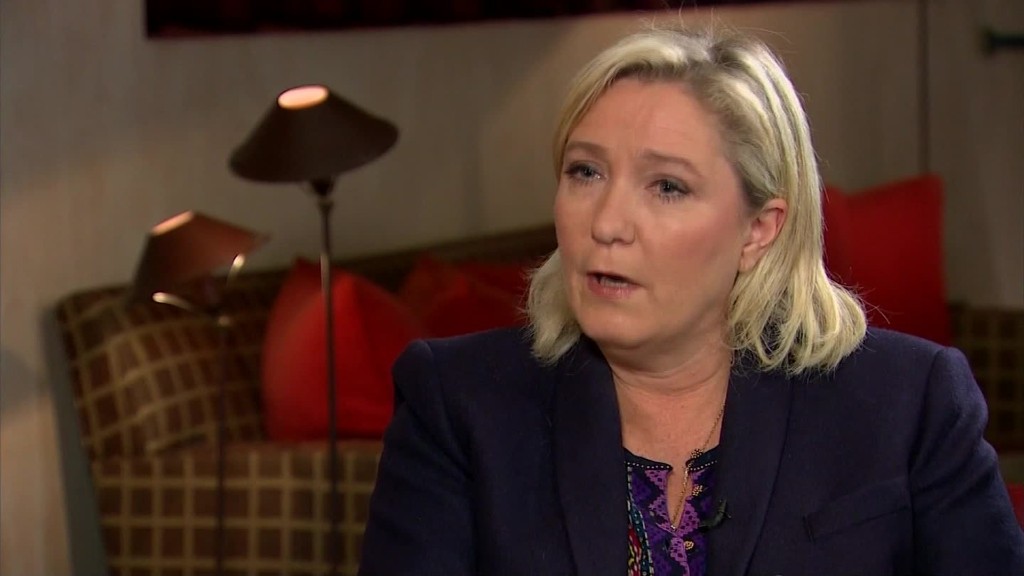
The populist French politician Marine Le Pen is making investors very nervous.
Fears are beginning to show in the bond market, where investors are selling French government debt over concerns that the far right politician just might overcome the odds and win the presidential election.
The difference in yields on French and German government bonds is now the largest in nearly four years, suggesting that investors now see French debt as a substantially riskier proposition.
Le Pen, the leader of France's National Front party, officially launched her presidential campaign Sunday with a speech attacking globalization and the dangers of immigration. She also pledged to pull France out of NATO. Much of her rhetoric matches that of President Trump in the U.S.
Le Pen wants France to drop the euro, an event that would throw the future of Europe's common currency into doubt. She has also threatened to hold a referendum on the country's membership in the European Union.
A French exit from the bloc would be far messier than the departure Britain is preparing to negotiate. France is one of the group's founding states, and the second biggest eurozone economy.
"People are feeling slightly more concerned about owning French debt because of a very small but growing risk that that debt is ultimately re-denominated [from euros] into francs," said Jennifer McKeown, chief European economist at Capital Economics.
"People are starting to consider the risk of a eurozone exit, [but] not considering it as fully as I think they ought to be," she added.
Related: How Europe's elections could be hacked
Here are some other economic promises Le Pen made during her campaign launch speech:
Protectionism: Le Pen outlined a range of trade policies, described as "intelligent protectionism," that included measures to promote French businesses while protecting them from foreign competitors.
For example, French companies would be given priority when bidding on public contracts.
Tax on foreign workers: She has also promised to introduce a tax on French companies that hire foreign workers.
Reduce immigration: Le Pen wants to slash legal migration into France to 10,000 "entries" per year. She also wants to limit immigrants' access to public services. In an earlier interview with CNN, she said France is "being attacked by radical Islam."
Tax cuts: Le Pen is looking to cut income taxes, simplify tax rules and fight tax evasion.

The French election system involves two rounds of voting: The first round is scheduled for April 23, with a runoff to be held on May 7 if no candidate gets more than 50% of the vote.
Le Pen has received a boost because of a scandal that has ensnared a top opponent, the conservative candidate Francois Fillon.
The investigative newspaper Le Canard Enchainé published allegations last week that Fillon's wife, Penelope, and two of his adult children were given no-show jobs that earned them nearly €1 million ($1.1 million).
The couple has denied the allegations and no charges have been filed.
Related: Facebook, Google to help fight fake news ahead of French elections
Le Pen is expected to get the most votes of all the candidates in the first round, but she's expected to lose in the second round as voters rally behind a more traditional politician with less radical plans.
The independent centrist candidate Emmanuel Macron is considered to be a strong contender.
But expectations don't always match reality. Charles Lichfield, a European associate at the political risk firm Eurasia Group, said bond investors are right to be concerned.
"We have this low but non-negligible probability that she'll win," he said. "There's such a high impact if she were to win, investors are understandably worried."


